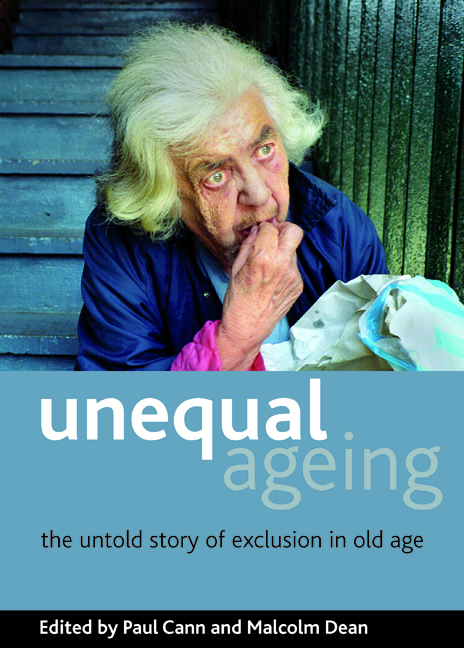Book contents
- Frontmatter
- Contents
- List of tables and figures
- Notes on contributors
- Acknowledgements
- one How social age trumped social class?
- two Too tight to mention: unequal income in older age
- three three The uneven dividend: health and well-being in later life
- four No place like home? Housing inequality in later life
- five What does it mean to be old?
- six A life worth living? Quality of life in older age
- seven Why is ageing so unequal?
- eight Rewriting the story
- Index
one - How social age trumped social class?
Published online by Cambridge University Press: 16 July 2022
- Frontmatter
- Contents
- List of tables and figures
- Notes on contributors
- Acknowledgements
- one How social age trumped social class?
- two Too tight to mention: unequal income in older age
- three three The uneven dividend: health and well-being in later life
- four No place like home? Housing inequality in later life
- five What does it mean to be old?
- six A life worth living? Quality of life in older age
- seven Why is ageing so unequal?
- eight Rewriting the story
- Index
Summary
As New Year's Day dawned in 2009 there was a very special 100th anniversary. No, not another centenarian qualifying for a Queen’s ‘telegram’, but the 100th anniversary of the start of British state pensions, introduced by Lloyd George's Liberal government on 1 January 1909. Grateful recipients were reported to have cried ‘God bless the Lord George’ as they collected the first of their weekly five shillings (25p, or about £20 in today's money). For financial reasons the Treasury had insisted that it should not start before people were aged 70, and there should be strict means tests. So nothing unfamiliar there. But there were also ‘character’ tests, and among the ineligible were the unemployed, alcoholics, people who had been in prison in the last 10 years or those with incomes of over 12 shillings a week. Even so, about 500,000 people were eligible for the new benefit – 40 per cent of the 70-plus age group.
Life expectancy at birth in those days was about 48 for men and 52 for women, but that was because of the phenomenally high infant and child mortality rates. In 1900 over one-third of all deaths were in the under-fives and barely more than 10 per cent in the over-75s. Those who survived childhood had a reasonable chance of reaching 70 – the Bible's benchmark for the end of life, three score years and ten – and could expect to live for a further nine years.
According to the Office for National Statistics (ONS) the number of centenarians in this 100-year period began increasing slowly in the first 50 years, from 100 to 270, but has since spouted with enormous energy to about 12,000 in 2009. The government's Actuary Department’s projections for further growth are even more startling: by 2029 a fourfold increase to 48,000; by 2036 an eightfold increase to 96,000; and by 2046 a sixteenfold increase to 192,000. Equally startling is the projection for the babies born in 2009: one in four can expect to live to 100. Lower down the age cohorts the proportion of people over 65 is expected to grow by 60 per cent in the next 25 years, six times the rate of the general population rise.
- Type
- Chapter
- Information
- Unequal AgeingThe Untold Story of Exclusion in Old Age, pp. 1 - 24Publisher: Bristol University PressPrint publication year: 2009



